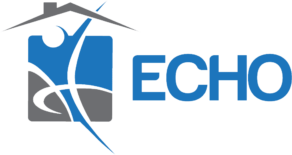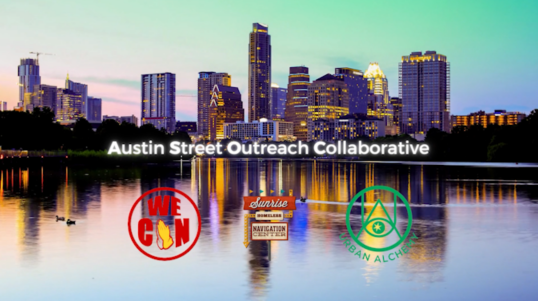Austin Street Outreach Collaborative announces inaugural members
AUSTIN (April 19, 2022) –The Ending Community Homelessness Coalition (ECHO) is excited to announce the kickoff of the Austin Street Outreach Collaborative (ASOC), an initiative to build a stronger infrastructure for racially equitable, data-driven, and sustainable service delivery for the unhoused population.
ASOC is now under way and beginning operations in Austin following ECHO’s signing of the collaborative’s inaugural members: three organizations that will split $2 million from St. David’s Foundation to develop an equitable outreach network to engage people and communities the Homelessness Response System (HRS) has never reached or attempted to reach before.
The new partners, introduced via this video to our HRS governing body in early April, bring a wide range and a depth of capabilities:
- We Can Now, a force for good founded by an East Austinite with firsthand experience of homelessness;
- Sunrise Homeless Navigation Center, a pillar in both the faith and homelessness services communities in Austin;
- Urban Alchemy, a California-based organization with a proven track record of providing person-centered services.
“People living unsheltered in our community are under constant threat of harm and displacement without the option of housing or adequate emergency shelter. The Austin Street Outreach Collaborative will provide much-needed emergency assistance. The organizations funded under the ASOC umbrella have demonstrated experience providing dignified person-centered services to the people they serve,” said ECHO Executive Director Matt Mollica. “ECHO is grateful to St. David’s Foundation for their commitment to fund an equitable system that will end homelessness in Austin and Travis County. This process highlighted a significant unmet need in our community. There were many great applicants for this funding that did not get awarded, and we would love to see our philanthropic community step in to help fill gaps for these organizations.”
The ASOC members will use the grant to collectively hire 12 full-time employees (or equivalent) and distribute $500,000 in direct assistance to people experiencing homelessness in the form of diversion and rapid exit, two light-touch interventions that help people end their homelessness quickly.
Selection Process
In selecting the ASOC partners, ECHO completed an exhaustive independent review process that included a monthlong open application process in which 22 agencies applied, requesting a total of 96 outreach positions and $4 million in direct assistance.
People with firsthand experience of homelessness, outreach providers, community advocates, and ECHO staff collaborated to prioritize selection criteria for agencies that applied for funding. Non-conflicted independent reviewers were randomly assigned applications to score, and ECHO selected the three applications with the highest scores to receive funding. About 73% of reviewers have firsthand experience of homelessness, 55% are people of color, and 45% are people of color with firsthand experience of homelessness.
All three organizations have signed Memorandums of Understanding (MOUs) with ECHO to begin operations and are currently in the process of hiring four outreach employees each. The MOUs took effect April 1.
Austin Street Outreach Collaborative Partnership
The three founding members began their partnership this month and are already seeing momentum as they build operations and networks.
- “There’s a choice we’re making: We’re saving our own lives,” said Antony Jackson, Founder and CEO of We Can Now. “I am excited about this ASOC opportunity for many reasons. It truly helps We Can Now with transformational capacity building, it allows us to provide more essential resources for our people and communities who are the most vulnerable, and it allows us a chance to come together and partner with other like-minded organizations that have been doing great work within the space to truly make a greater positive impact.”
- “ASOC is beginning its work at a critical juncture, as Austin’s homeless population is pushed around from place to place with no legal place lay their heads,” said Pastor Mark Hilbelink, Director of Sunrise Homeless Navigation Center. “It will be up to us to lead a new era of services that meet people where they are instead of waiting for them to come to us.”
- “We are really excited about Austin. It’s a beautiful place, with beautiful people, and we really feel the energy,” said Lena Miller, CEO of Urban Alchemy. “We are looking forward to partnering and serving with our new brothers and sisters of Austin.”
Community Outreach
The organizations will devote the coming months to hiring their outreach positions and standing up their operations on the streets of Austin based on their assessment of the needs and opportunity within the current infrastructure to support the unhoused.
ECHO and the ASOC partners are planning targeted community outreach in the coming months to provide key community partners with an overview of ASOC progress, the operations and coordination plan, and the metrics for success overview the two-year life of the program. Details about these engagements are forthcoming.
Key Details:
- Three organizations were selected – Sunrise Homeless Navigation Center, We Can Now, and Urban Alchemy – to establish the Austin Street Outreach Collaborative (ASOC)
- The organizations split $2 million in grant funding from St. David’s Foundation
- The funds will allow the organizations to collectively hire 12 full-time (or equivalent) outreach positions (four positions at each agency) and distribute $500,000 in direct assistance over two years
- An independent group of reviewers scored all applications, and the top three scoring applications were selected; about 73% of reviewers (8/11) have firsthand experience of homelessness, 55% (6/11) are people of color, and 45% (5/11) are people of color with firsthand experience of homelessness
- There’s a great need for additional investments in outreach: 22 agencies applied for grant funding, requesting a total of 96 outreach positions and $4 million in direct assistance
About the ASOC
The ASOC is the result of conversations among providers, unhoused community members, and ECHO that identified geographic dispersion and coordination as real needs within the crisis outreach system.
ECHO will serve as grants administrator for the two-year grant and will train and onboard the new positions. The Homelessness Response System Leadership Council (a group comprised of partners, stakeholders, equity advocates, and people with firsthand experience of homelessness who govern priorities, policies, and procedures in our local response system) will be central to developing ASOC program standards.
Similar coordinated outreach systems have been successful in other metro areas to ensure equitable and dispersed access to resources – creating more and different touch points so we can reach more individuals and connect them to services and housing. Using the “no wrong door” model, the ASOC ensures services can be accessed through a variety of locations and through a variety of service providers in ways that work best for those seeking assistance.
The ASOC creates 12 new full-time (or equivalent) positions in the community in three outreach capacities: SOAR (SSI/SSDI Outreach, Access, and Recovery) Specialists, Mobile Street Outreach Coordination, and Coordinated Assessors. These newly created positions will be filling a gap for grassroots organizations by providing trained assessors to gather essential data to incorporate in the Homeless Management Information System (HMIS) and better connect unhoused individuals with housing and the services best suited for their needs.
By training and deploying new positions into the community—going to unhoused individuals for data intake and coordination as opposed to requiring them to come to specific service provider locations—the ASOC will effectively expand the network of organizations putting data into HMIS and create a consistent intake process to better identify needs and gaps.
Media Contact: mediarequests@austinecho.org


